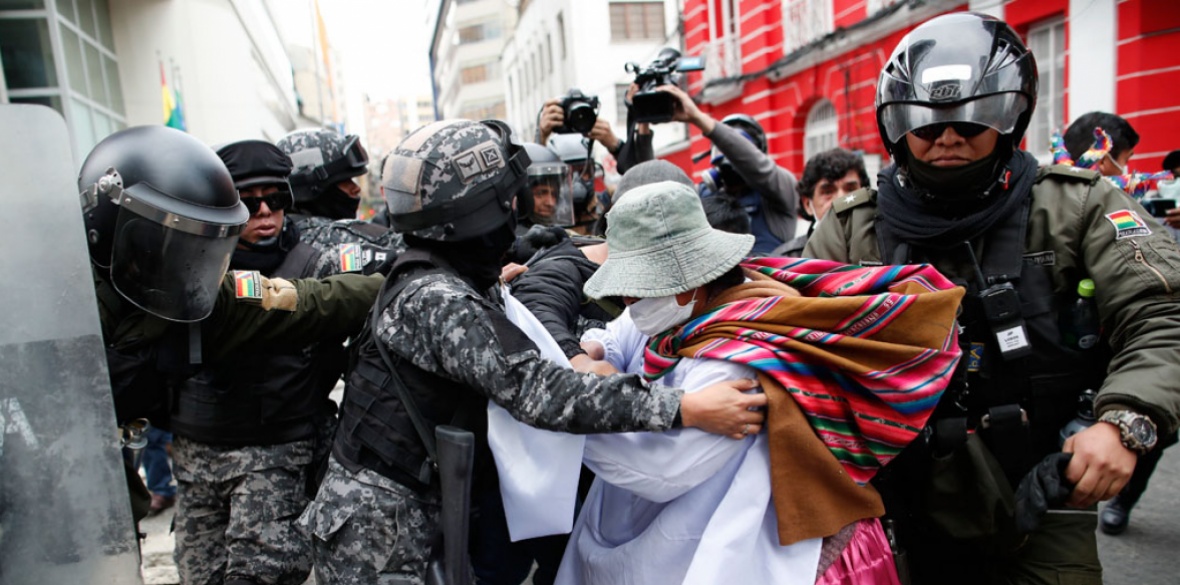This is the last article you can read this month
You can read more article this month
You can read more articles this month
Sorry your limit is up for this month
Reset on:
Please help support the Morning Star by subscribing here
WHATEVER some in the right-wing media may tell you, the resignation forced on President Evo Morales by the military was a coup.
As Bernie Sanders said: “it was the military who interfered in that process and asked him to leave. When the military intervenes... in my view, that's called a coup.”
Furthermore, the ousting of Morales followed a wave of right-wing opposition violence that lashed out at the country’s indigenous and peasant population, trade unionists and socialists. This trend has intensified since the coup.
Following the military forcing Morales to resign, a right-wing opposition senator and president of the senate Jeanine Anez declared herself president of Bolivia and was sworn in by the military.
This move was unconstitutional as the parliamentary session was not quorate because members of the Movement to Socialism (MAS) could not attend, as their security could not be guaranteed. MAS has a majority in parliament.
Since Anez took control the regime has, in order to stop surging protests against the coup, been violating human rights indiscriminately.
This has includes Anez signing a decree exempting the Armed Forces from criminal prosecution for the actions they deploy to control citizens. In practice, the decree means giving the military a license to kill in Bolivia and we already have seen this to be the case.
Last Friday the security forces attacked a crowd of civilians demonstrating in Cochabamba leaving nine Indigenous people dead in what can only be described as a massacre. On top more than 30 were injured and 169 arrested.
In response, the Inter-American Commission on Human Rights (IACHR) expressed “concern about the actions of the armed forces in the operations carried out in Bolivia since the beginning of the week” and stated that the “Inter-American standards establish the duty to limit their participation as much as possible in the control of internal disturbances,” adding in a clear warning that “firearms must be excluded from the devices used to control social protests.”
More people are getting injured or killed each day. The UN High Commissioner for Human Rights Michelle Bachelet said earlier this week that “we have information that at least seventeen people have died in the context of the protests, including fourteen only in the last six days,” but reports of further death keep coming through.
On Tuesday the Bolivian student group GEA exposed how the police were raiding homes in search of evidence to link students with anti-government marches.
This week the police also attacked a peaceful vigil in Cochabamba. The National Confederation of Indigenous Female Farmers spokesperson Maribel Avalos saying: “They began to repress us by throwing tear gas but the people are united.”
This repression of protestors is one of many developments that suggest Morales was right to warn that Bolivia is returning to being a repressive, right-wing dictatorship.
Media censorship has also been imposed, with the de facto communication minister saying that “seditious” journalists will be arrested.
Argentinean journalists from media such as TN, America 24, Cronica, and Telefe have complained of being attacked and there have already been warnings from the Office of the Rapporteur for Freedom of Expression regarding “threats of expulsion by Bolivian authorities,” and “attacks and use of gas tears by the police against journalists covering the protests."
As a further part of this repression, Bolivia’s Interior Minister Arturo Murillo has also announced the creation of a “special apparatus at the Prosecutor's Office” to arrest MAS parlamentarians for promoting “subversion and sedition.”
As a part of this pattern towards a complete clampdown on the Left, Anez has also said that the MAS does not have guaranteed participation in the next elections (whenever they may happen), saying that it was for the Supreme Electoral Tribunal to “decide whether or not MAS will participate again.”
Despite the repression by the government, this struggle is far from over and more and more people in Bolivia are resisting and demanding a return to democracy.
Morales said this week: “The people will resist this dictatorship with great courage, force, and energy.”
International opposition to what has happened in Bolivia is also growing, including within Latin America itself.
Both chambers of the Argentine parliament have passed resolutions to condemn the coup, with both the left and right-wings voting in favour. In the Senate, Senator Mario Pais said: “Evo Morales was forced to asylum in another country because the army and the police broke their constitutional obligations and that means a coup d'etat.”
And in the Chamber of Deputies, the resolution passed expressed “its repudiation of the coup d'etat perpetrated in Bolivia, which forced President Evo Morales and his vice president to resign to preserve peace.”
Here in Britain, the recently launched Friends of Bolivia campaign has already received widespread support and will be active in the weeks and months ahead, including at the demonstration against Trump on December 3.
Join us and show your solidarity.
Follow Friends of Bolivia at www.facebook.com/BoliviaFriends. You can sign a petition at bit.ly/notothecoupinBolivia












